|
|
|
Sort Order |
|
|
|
Items / Page
|
|
|
|
|
|
|
| Srl | Item |
| 1 |
ID:
158651
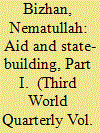

|
|
|
|
|
| Summary/Abstract |
Under what conditions does foreign aid in the aftermath of war foster state-building? This article argues that institutional legacy and continuity and the politics of aid may matter. In the aftermath of war, for an aid regime to reinforce state-building, it may need to ensure continuity in the strength of the state and to use recipient mechanisms and finance policies that generate a greater state capacity. The existence and continuity of a Weberian state may increase the likelihood of effective state-building. If the state is relatively strong, with a Weberian bureaucracy, aid can further reinforce it when aid is spent through national systems or is aligned with local priorities, with efforts to ensure that the recipient leaders reinforce state effectiveness by implementing policies that may require greater state capacity. Evidence for this argument is provided through pairwise comparison of state-building patterns between South Korea and Taiwan.
|
|
|
|
|
|
|
|
|
|
|
|
|
|
|
|
| 2 |
ID:
158652
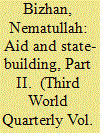

|
|
|
|
|
| Summary/Abstract |
Part I of this article found that, in South Korea and Taiwan, institutional legacy and continuity as well as the politics of aid did matter for post-war state-building. The inheritance and continuity of Weberian states and the receipt of aid either as budget support or increasingly aligned with local priorities helped to foster state-building. Part II of the study in this article explores a different dynamic of post-war aid to Afghanistan and Iraq which had a legacy of neopatrimonial and weak states. It argues that under more adverse initial conditions – for a neopatrimonial state – the role of aid regime and state-building strategies become even more important. Under these conditions, aid and state-building strategies may undermine state-building if they induce discontinuity in the existing state capacity and create parallel institutions to those of the state. Depending on the policies, state weakness may be reinforced if leaders are preoccupied with the politics of patronage.
|
|
|
|
|
|
|
|
|
|
|
|
|
|
|
|
| 3 |
ID:
158641
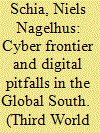

|
|
|
|
|
| Summary/Abstract |
How does digitalisation lead to new kinds of global connections and disconnections in the Global South? And what are the pitfalls that accompany this development? Much of the policy literature on digitalisation and development has focused on the importance of connecting developing countries to digital networks. Good connection to digital networks may have a fundamental impact on societies, changing not only how individuals and businesses navigate, operate and seek opportunities, but also as regards relations between government and the citizenry. However, the rapid pace of this development implies that digital technologies are being put to use before good, functional regulatory mechanisms have been developed and installed. The resultant shortcomings – in state mechanisms, institutions, coordination mechanisms, private mechanisms, general awareness, public knowledge and skills – open the door to new kinds of vulnerabilities. Herein lie dangers, but also opportunities for donor/recipient country exchange. Instead of adding to the already substantial literature on the potential dividends, this article examines a less studied issue: the new societal vulnerabilities emerging from digitalisation in developing countries. While there is wide agreement about the need to bridge the gap between the connected and the disconnected, the pitfalls are many.
|
|
|
|
|
|
|
|
|
|
|
|
|
|
|
|
| 4 |
ID:
158647
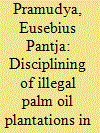

|
|
|
|
|
| Summary/Abstract |
The Indonesian state has issued many regulations to control palm oil expansion, but they have been weakly enforced, resulting in widespread illegal plantations. During the last decade, Indonesian authorities have used force to reduce illegal plantations. This article analyses the drivers behind these actions and questions to what extent they reflect the rise of eco-authoritarianism. By investigating six cases of disciplinary action in Sumatra, we conclude that the Indonesian state is neither practising eco-authoritarianism nor constituting a green state. The disciplinary action, however, has had limited success in environmental terms due to policy incoherence, violent contestation and the sector’s historical context.
|
|
|
|
|
|
|
|
|
|
|
|
|
|
|
|
| 5 |
ID:
158645


|
|
|
|
|
| Summary/Abstract |
In the Democratic Republic of Congo, donors promoted rapid liberalisation and presidential elections in the aftermath of the war, and after two terms, President Kabila has not left office. This article engages with the question of how liberalisation and elections are connected, and how they are related to the extension of presidential power. It finds that the international market for minerals has shaped the domestic political economy but its nature has effectively been ignored in the formulation of donor policy; efforts at regulating trade have been concentrated on due diligence of origin in Congo but have not addressed the secrecy of international trade. Liberalisation has removed control of economic resources from Congo, provided returns for elite politicians and funded violence to control the disenfranchised population. The offshore companies are the elephant in the room; without acknowledging them, analysis of the liberalisation and its interaction with presidential tenure lacks assessment of the opportunities, interests and power that shaped the processes.
|
|
|
|
|
|
|
|
|
|
|
|
|
|
|
|
| 6 |
ID:
158643
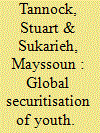

|
|
|
|
|
| Summary/Abstract |
This article looks critically at the new global youth, peace and security agenda, that has been marked by the passage of United Nations Security Council Resolution 2250 in December 2015. It argues that this agenda needs to be situated within the broader context of the securitisation of development, and that the increasing interest in youth as a security subject and actor is shaped by three overlapping sets of global security concerns: the concept of the youth bulge is a euphemism for the problem of growing surplus populations worldwide; the ideal of youth as peacebuilders is a model for eliciting youth support for the current global social and economic order; and the spectre of globally networked youth being radicalised by extremist groups has legitimated joint state and private sector projects that are taking an increasingly active role intervening in the online lives of young people around the world. The article draws on an analysis of a collection of core documents that form the heart of the global youth and security agenda; and it argues for the need for greater critical reflexivity in considering the growing attention being paid to youth as a social category in global development and policy discourse.
|
|
|
|
|
|
|
|
|
|
|
|
|
|
|
|
| 7 |
ID:
158642
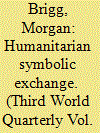

|
|
|
|
|
| Summary/Abstract |
Moral common sense frames the relationship between privileged and at-risk populations underpinning contemporary Responsibility to Protect (R2P) discourse. This article develops an alternative by considering the relationship between archetypes of would-be rescuers and victims through Jean Baudrillard’s theorisation of symbolic exchange. Baudrillardian analysis connects personal morality and affective intersubjective symbolic exchange with the politics of international order. This leads, first, to an argument that current foundations for advocating R2P risk participating in a problematic moral economy of symbolic exchange between would-be rescuers and victims. Nonetheless, and secondly, the article deploys symbolic exchange to develop suggestions for partially re-figuring R2P’s humanitarian impulse by engaging ‘locally’ – both through one’s self (in the ethical relation suggested by Emmanuel Levinas) and with diverse forms of political order (following Jacques Rancière’s conception of politics). Doing so supports moves to engage a wide array of individual actors in a more interactive and less hierarchical form of R2P, to drive deeper consideration of local complexities of R2P through engagement with diverse local forms of political order, and to develop a more inclusive understanding of ‘humanity’ in order to bolster R2P’s normative foundations.
|
|
|
|
|
|
|
|
|
|
|
|
|
|
|
|
| 8 |
ID:
158650
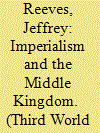

|
|
|
|
|
| Summary/Abstract |
This article applies the Nexon/Wright concept of ideal-type empire to the study of China’s post-2012 peripheral relations to demonstrate that the Xi administration is engaged in a concerted imperialist policy towards its developing neighbour states. Using the Nexon/Wright framework, the article demonstrates how the establishment of a China-centric regional network structure undergirds the Xi administration’s key foreign policy concepts and how these concepts, in turn, inform China’s bilateral relations with its peripheral states. To demonstrate how China employs imperialist tactics to its pursuit of a regionally based order, the article examines China’s bilateral relations with the developing states on its periphery: Mongolia, Kazakhstan, Tajikistan, Kyrgyzstan, Afghanistan, Pakistan, Nepal, Myanmar, Cambodia, Lao PDR and Vietnam.
|
|
|
|
|
|
|
|
|
|
|
|
|
|
|
|
| 9 |
ID:
158648
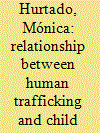

|
|
|
|
|
| Summary/Abstract |
The article rethinks the relationship between human trafficking as organised crime and child recruitment as a war crime. After analysing the records of 132 cases of child and adolescent recruitment brought before Colombia’s ordinary justice system between 2008 and 2016, it became clear that the youngsters involved had performed activities both directly and indirectly related to the conflict, but also that they had been exploited and maltreated, with no control over their situation. Reassessment of the relationship between human trafficking and child recruitment could result in more effective justice for this population by shedding light on alternate ways to construct reparation and reintegration.
|
|
|
|
|
|
|
|
|
|
|
|
|
|
|
|
| 10 |
ID:
158644


|
|
|
|
|
| Summary/Abstract |
A central theme of the literature on rising powers is that new aspirants to great power status pose a challenge to the underlying principles and norms that underpin the existing, Western-led order. However, in much of the literature, the nature and significance of rising powers for international order are imprecisely debated, in particular the concept and practice of ‘contestation’. In this article, we aim to establish a distinction between normative contestation and what can be thought of as ‘contestation over representation’: that is, contestation over who is setting and overseeing the rules of the game rather than the content of the rules themselves and the kind of order that they underpin. The paper engages with debates on international order and international society, and its empirical basis is provided by a thorough analysis of the discourse of rising power summitry.
|
|
|
|
|
|
|
|
|
|
|
|
|
|
|
|
| 11 |
ID:
158646
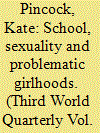

|
|
|
|
|
| Summary/Abstract |
This paper draws on ethnographic research with teenage schoolgirls in Tanzania to explore the impact of education on their experiences of sexual agency and empowerment. School-based education is frequently presented within international development as a route for empowering girls to exercise agency over their sexuality; yet school itself often constitutes a space in which the same restrictive gendered and sexual norms that exist outside the classroom are reproduced or go unchallenged by those working with girls. Despite the constraints to their agency from both outside and within school, girls themselves do resist the narratives of girlhood and sexuality imposed upon them. Recognising how these dynamics challenge our understanding of sexual empowerment is key to finding ways to support girls in navigating repressive norms beyond the classroom.
|
|
|
|
|
|
|
|
|
|
|
|
|
|
|
|
| 12 |
ID:
158649


|
|
|
|
|
| Summary/Abstract |
Drawing on fieldwork in three Andean regions of Peru, this article analyses the capacity of corporate social responsibility (CSR) to reduce mining-related violence in rural communities in developing countries. Within Peru, to some extent CSR has stabilised short-term relationships between mining corporations and nearby communities, although tensions remain high in others. While effects are varied and locally-contingent, the findings support a theoretical understanding of CSR as deeply embedded in legitimising the violence of capitalism, including the slow violence from degrading local environments.
|
|
|
|
|
|
|
|
|
|
|
|
|
|
|
|
|
|
|
|
|